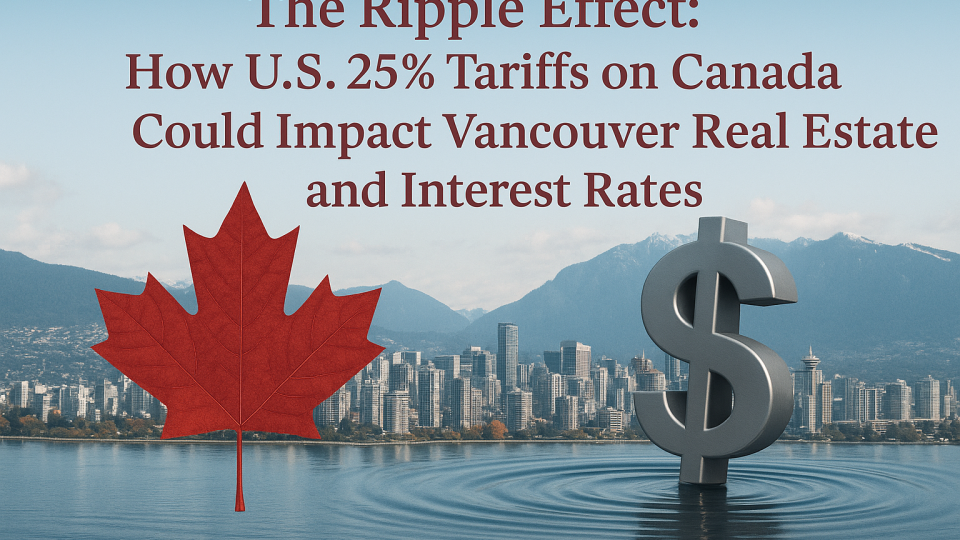
The Ripple Effect: How U.S. 25% Tariffs on Canada Could Impact Vancouver Real Estate and Interest Rates
The U.S. recently announced 25% tariffs on Canadian goods, a move that has the potential to send shockwaves through the Canadian economy. While these tariffs will directly impact industries such as steel, aluminum, and manufacturing, their indirect effects could extend much further—including the Vancouver real estate market.
Understanding the Impact of 25% Tariffs on Canada
Trade tariffs function as a tax on imported goods, increasing costs for American buyers and reducing demand for Canadian exports. This decline in demand could slow down key Canadian industries, leading to potential job losses, lower GDP growth, and an overall economic slowdown. Additionally, with trade tensions rising, business investment could take a hit as companies reassess supply chains and growth plans.
For a trade-dependent economy like Canada, heavily reliant on exports to the U.S., these tariffs could pose significant economic challenges. Sectors such as manufacturing, natural resources, and auto parts are particularly vulnerable, and any downturn in these industries could have a domino effect on the broader economy, including the real estate sector.
Will Vancouver Real Estate Be Affected?
Vancouver’s real estate market is largely driven by factors such as immigration, foreign investment, interest rates, and local economic conditions. While tariffs themselves may not directly impact real estate transactions, their broader economic consequences could indirectly affect demand and affordability.
1. Reduced Economic Growth Could Slow Housing Demand
If key industries suffer due to reduced exports, job losses or lower wages may follow, leading to reduced consumer confidence. A weaker economy can translate into less demand for housing, particularly in higher-end markets. However, Vancouver’s luxury market has historically been driven by international buyers rather than just local economic factors, which may cushion any immediate impact.
2. Potential for Lower Interest Rates to Offset the Economic Slowdown
One of the key questions for real estate investors and homebuyers is how these tariffs will impact Canadian interest rates. If economic growth slows due to reduced exports, the Bank of Canada may respond by cutting interest rates to stimulate the economy. Lower rates make borrowing cheaper, allowing buyers to qualify for higher mortgage amounts and increasing overall purchasing power.
3. A Shift in Market Activity
While Vancouver’s real estate market has already experienced some cooling due to policy changes and interest rate hikes, any significant rate cuts in response to a weakening economy could reinvigorate buyer activity. First-time buyers, in particular, stand to benefit from a lower interest rate environment, as they can afford more expensive homes with the same income levels.
Could Tariffs Lead to a Rate Cut?
If tariffs significantly disrupt economic growth and push Canada towards a slowdown, the Bank of Canada could be forced to lower interest rates. This scenario is plausible given that Canada is already dealing with high levels of household debt, making monetary policy a key tool for maintaining economic stability.
With inflation showing signs of easing, the Bank of Canada could justify a rate cut to counteract the negative effects of reduced trade. Lower interest rates would benefit homebuyers by improving affordability, potentially leading to increased real estate activity in cities like Vancouver.
Final Thoughts: Uncertainty, but Opportunity
The 25% U.S. tariffs on Canada introduce a layer of economic uncertainty that could have far-reaching implications. While industries reliant on U.S. exports may feel the pinch, the real estate market in Vancouver could see mixed effects. If the Bank of Canada responds with lower interest rates, more buyers may enter the market, increasing demand for homes.
For investors and homebuyers, the key will be to stay informed and be prepared to act in a shifting landscape. Those considering purchasing property in Vancouver should keep an eye on interest rate decisions, as a potential rate cut could open up new opportunities in the market.
As always, staying ahead of economic trends and understanding their impact on real estate will be crucial for buyers, sellers, and investors alike. If you’re looking for expert insights on how to navigate these changes, feel free to reach out!